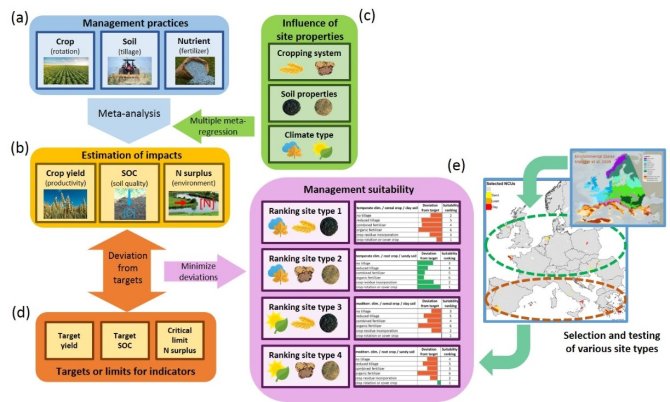
Project
Decision support for integrated evaluation of agricultural management impacts on crop yield, soil quality and environment (INSPIRATION)
Current agricultural management practices, such as heavy machinery and elevated fertilizer use, often lead to soil degradation, affecting crop growth and environmental quality. Improved integrated farm management is therefore needed for agriculture to intensify sustainably.
Introduction
This project will develop a decision support system for stakeholders and policymakers and will test it on typical regions of North-western Europe. It will evaluate the overall benefits and trade-offs of farm management approaches on the quality of soil, environment, and crop growth, using a selection of sustainability indicators to assess impacts on soil compaction as well as carbon, phosphorus and nitrogen cycles.
Objectives
The aim of this PhD project is to develop decision support system (DSS) to evaluate the benefits and trade-offs of farm management strategies on agricultural production and environmental impacts quality while accounting for the spatial variation in agro-ecosystem properties. Impacts will focus on crop yields, soil quality in terms of the soil balance of C, N, and P and soil compaction, and losses of N and P affecting air and water.
Methods
A combined meta-analytical and process-based modelling approach is used to quantify relationships between management and impacts. The focus is on the following aspects: (i) crop growth, (ii) soil carbon, nitrogen, phosphorus and compaction and (iii) nutrient losses to the environment. Meta-regression is applied to assess the influence of agro-ecosystem properties on the management-impact relationships. Existing sustainability indicators as well as target and critical values from literature serve as evaluation criteria for the impacts of management strategies on the quality of crop growth, soil and environment. The next objective is to develop a flexible and spatially-explicit model framework, integrating the indicators and target values into a multi-criteria impact assessment. The multi-criteria analysis uses distance to target or critical values to evaluate the sustainability of a management practice. This is with the goals of maximizing agricultural intensification (e.g., fertilizer use efficiency, crop yields, land use) and minimizing negative environmental externalities. The outcome of this project is a decision-support framework that can select appropriate management options for typical soil crop combinations in temperate regions.

Results
Results until now include impacts of measures as derived by meta-analysis and a first set-up of the decisions support system
1. In total 113 meta-analytical studies were systematically evaluated to assess impacts of crop management measures (rotation, cover cropping, residue retention), soil and water measures (irrigation, tillage), soil amendments (enhanced efficiency, biochar), fertilizer use (organic, mineral, combined organic-mineral) and “4R” fertilizer strategies (right source, rate, timing, placement) on sustainability indicators. These indicators include crop yield, crop N and P (content, uptake, and use efficiency), soil quality indicators (soil organic C, N and P contents, compaction), soil emissions of ammonia (NH3) and greenhouse gases (CO2, N2O), and nutrient losses to water (N and P surplus or leaching). Nutrient management, including 4R practices as well as enhanced efficiency amendments, had the largest impact, increasing crop yields and N uptake while reducing N2O and NH3 emissions as well as N surplus, whereas effects on CO2 emissions were variable. Crop management measures had variable effects on crop yield, but reduced N losses, while minimum tillage had small and/or variable impacts on crop yield, SOC and N losses. Site-specific factors had substantial impacts on the evaluated impacts of measures, most importantly climate, crop type, soil texture, soil pH, soil organic C, N dose, and experimental duration. More information is given in Young et al, 2021a.
2. A data-driven decision support framework has been developed, focusing on the evaluation of agronomic measures to reach agronomic and environmental targets. The potential of this approach is demonstrated by a proof of principle for 81 selected farm types across Europe, focusing on measures with respect to crop rotation, fertilization and soil tillage. Synthesizing data from long-term experiments and meta-analytical models (as mentioned above), the impact of these measures on crop yield, SOC and N surpluses were estimated on all farm types, while accounting for site specific properties for the current and desired situation. Optimum sets of agronomic measures were been selected in order to maximize crop yield and SOC levels and minimize N surpluses to reach the critical values for NO3- concentrations in ground water. Our results illustrate that the suitability of measures varies by soil, climate and crop types within Europe. More information is given in Young et al, 2021b.
Publications
Young, M.D., G.H. Ros and W. de Vries, 2021a. Impacts of agronomic measures on crop, soil, and environmental indicators: a review and synthesis of meta-analysis. Agriculture, Ecosystems & Environment 319 (2021) 107551. https://doi.org/10.1016/j.agee.2021.107551
Young, M., G.H. Ros and W. de Vries, 2021b. A decision support framework assessing management impacts on crop yield, soil carbon changes and nitrogen losses to the environment. Eur J Soil Sci. 72: 1590–1606. https://doi.org/10.1111/ejss.13024